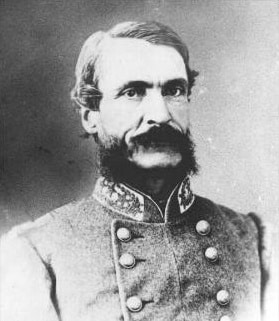James Patton Anderson was an officer in the Civil War for the Confederacy. He was also a lawyer, physician, and politician during and after the war. He served in the Army of Tennessee.

Early Life
- James Patton Anderson was born in Franklin County, Tennessee
- In 1831, his family moved to Kentucky, and by 1838 had moved to Mississippi
- He attended Medical school at Jefferson College in Canonsburg, Pennsylvania in 1840
- A family financial problem caused him to take a break and return home. He resumed his studies once it was taken care of and still managed to graduate in 1842.
- After beginning his medical practice, he decided to attend Law School at Montrose Law School in Frankfort, Kentucky.
- He was admitted to the bar in 1843, just one year after graduating from medical school.
- After being admitted to the bar, he established a practice in DeSoto County, Mississippi.
- He joined the military and served in the militia during the Mexican-American War, where he was given command of the 2nd Battalion, Mississippi Rifles, with the rank of lieutenant colonel.
- His successful career in medicine, law, and the military made him a natural fit for politics. He served in the Mississippi House of Representatives, where he became friends with Jefferson Davis.
- During the presidency of Franklin Pierce, Jefferson Davis appointed Anderson as U.S. Marshal for the Washington Territory.
- He served as a U.S. Marshal in Olympia for many years until being elected to Congress as a Democrat.
- He moved back to the south to the state of Florida. He became the plantation owner of "Casa Bianca"
- He was an active participant
Civil War
- Before the Civil War broke out, Anderson was appointed a captain in the Florida militia.
- When Florida seceded from the Union, James Patton Anderson became one of the three delegates from Florida to the Provisional Congress of the Confederate States.
- He accepted a commission as the Colonel of the 1st Florida Infantry and initially served under Braxton Bragg in Pensacola.
- He then commanded the 2nd Brigade of the Army of Pensacola from October 12, 1861 - January 27, 1862.
- He received a promotion to Brigadier General on February 10, 1862.
- He was assigned to the Western Theater and commanded a brigade at the Battle of Shiloh.
- He fought with the Army of Tennessee at the battles of Perryville, Stones River, Chickamauga, and Chattanooga.
- He was promoted to Major general on February 17, 1864.
- Anderson served in the Atlanta campaign when he led a division in Leonidas Polk's Corps in the Army of Tennessee at the battles of Ezra Church, Utoy-Creek and in the early stages of the Battle of Jonesboro.
- His health declined, but he continued to serve with his men until their surrender at Greensboro, North Carolina.
- He received a pardon from the U.S. Government on December 2, 1866.
Later Years
- After the war, Anderson returned to Tennessee and resided in Memphis.
- He had a hard time working due to his injuries in the war, but managed to sell insurance and become the editor of a small agricultural newspaper.
- Despite his medical school training, law degree, political career, and multiple talents, he died in relative poverty at his home in Memphis at the age of 50. He just could not shake his war wounds.
